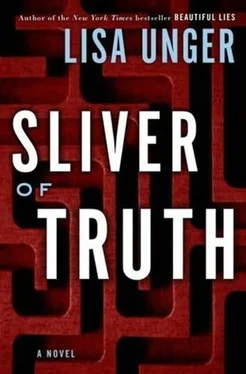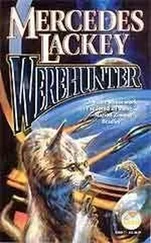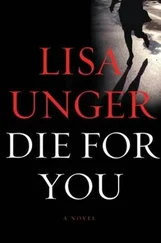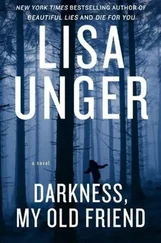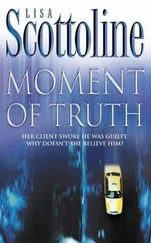He looked at me sadly, stood, and followed me out into the loft space. “I’m sorry, Ridley.”
“You’re not sorry!” I screamed. I took a deep breath and lowered my voice. “You just want me to be as miserable and obsessed as you are. You want me trapped with you in a past that neither one of us can ever change no matter how badly we want to. It’s not fair. I don’t want to be here with you anymore.”
He didn’t react, though I could see the pain in his eyes. He walked back into his office for a second, returned with a file folder.
“Just read this stuff, Ridley. I’m not going to say another word about any of this to you…ever again. Just read my research and come to your own conclusions. Call me when you’re ready.”
I wanted to throw the file at him. I wanted to throw myself at him and punch him as hard as I could a thousand times. I wanted to take him in my arms, comfort him and be comforted by him. Instead of any of these options, I exited the loft in silence. I could have left him and the file behind and never looked back. But, of course, you know me better than that by now. Once we’ve started on the road toward the truth, there’s no turning back. The Universe doesn’t like secrets.
FOLLOWING THE DIRECTIONS I’d printed out from MapQuest, I pulled off the highway and onto a smaller main drag that led past strip malls and office buildings. This suburb of Detroit seemed like a parade of prefab buildings, indistinguishable from every other American ’burb: Chick-Fil-A and Wal-Mart, Taco Bell and Home Depot, the mandatory Starbucks. Peppered among the chains, small run-down independent stores-a butcher, a mechanic’s garage, a consignment shop-stood like rebel soldiers protesting the encroachment of the corporate giants. They seemed dilapidated and near defeat. I noticed that there were no sidewalks, though I could see houses on the back streets. I drove for miles and didn’t see one person walking. And people think New York City is scary.
The area seemed to improve after a while and started to look familiar as I neared my grandparents’ old neighborhood. I knew that their one-story ranch house, where my father and later Max had been raised, had been purchased by a young professional couple and torn down, replaced by a much larger, brand-new home. I turned onto their old street, narrowly avoiding a side-impact collision that would have been completely my fault. (I’m the world’s worst driver, partially from inexperience and partially from my mind’s tendency to wander. Many New Yorkers, most maybe, don’t drive-we walk or we ride. We take the subways or-too often in my case-hail cabs. These are activities where mind-wandering is perfectly acceptable, even preferable. Driving, I’ve noticed, requires more focused attention.)
I looked for my grandparents’ lot on the street, but it seemed that most of the homes had recently been erected. I couldn’t remember the street number nor could I pick it out based on any of the nebulous memories I had. The old ranch houses that had once characterized the neighborhood were now mostly gone, except for a few that looked dwarfed and gray among the gleaming new two-stories. At the end of the street, I found the address I was looking for: 314 Wildwood Lane. It was easily the oldest and most run-down house on the street, with an old Chevy up on blocks in the driveway. I pulled along the side of the lawn and came to a stop, felt my heart start to hammer.
You’re probably wondering, What the hell is she doing in a Detroit suburb? It was a question I asked myself as I sat in the rented Land Rover, heat blasting. I was starting to wonder if I was as nuts as Jake, in my own way.
I’D LEFT JAKE’S loft filled with fury, but on the train ride home, I felt the black fingers of depression tugging at me. I’d been fighting them off for a year, but the blackness always loomed, threatening to take me over. I knew if I stopped moving and turned around to see its face, it would eat me alive. My anger faded, leaving a killer headache in its wake.
I didn’t even take my coat off after I entered my apartment. I just sat at the dining-room table (a mammoth metal thing Jake had made and which I hated more with each passing day for its cold and utterly unwelcoming aura) and flipped open the file, which was crammed with newspaper articles, documents, and pages of handwritten notes in what I recognized as Jake’s nearly illegible scrawl.
At first glance it seemed like a jumble of unconnected pieces of information, most of which was already known to me. I noticed a copy of the medical examiner’s report from the night Max died; I flipped through the stapled pages, but nothing seemed out of the ordinary to me (not that I’d ever seen an actual medical examiner’s report). Jake had circled the estimated time of death, but it seemed consistent with what I knew about that night. I saw that Esme Gray had identified the body. This gave me pause. I had always believed that my father had been the one to ID the body. Max’s face was ruined, I remember him telling me; he wasn’t wearing a seat belt and had gone through the windshield. Jake had circled Esme’s name but I couldn’t determine why.
There were a few articles from the days following Max’s death reporting the incident, as well as some larger features about Max and his philanthropy, about his foundation being established to fund programs that aided battered women and abused children, about his incredibly successful career as a real-estate developer. I flipped through these without really reading Jake’s notes in the margins-the ones I glanced at seemed vague and somewhat weird, paranoid. For example, next to a sentence that lauded Max’s charity work, Jake had written: Lies!
The next grouping of articles seemed to have no relationship to Max at all; they were various crime stories about the tristate area and from around the world. The London Times reported on a frightening trend of young women in Eastern Europe disappearing from nightclubs and raves, never to be heard from again. The Guardian reported on the investigation of the murder of a young black woman whose torso was found floating in a canal. Police were making tentative connections between the young woman, who was of African Caribbean descent, and the ritual killings of a young boy and a prostitute earlier in the year, whose dismembered bodies were found in close proximity. A printout from the BBC website reported on the trafficking of women and children out of Albania and their subsequent torture and sexual slavery. The whole enterprise was nearly impossible to prevent or prosecute because of the Albanian and Italian police forces’ collusion with organized crime and the unwillingness of the women who had been rescued to identify their captors. There were pictures of an Albanian Mafia speedboat being intercepted by police in the Adriatic Sea, some photos of pretty, sad-faced women standing before a judge, some blurry images of known mobsters at a table in a café.
There were several articles from the New York Times related to organized crime, to body parts found in the East River, a murder on the Upper West Side, some missing young women. At the time, I didn’t see anything that connected them. Ugly news about an ugly world-what else was new? I realize now that I came to that file wanting it to prove that Jake had grown unstable, that he was grasping at straws. And I saw what I wanted to see: nothing. I released a sigh and realized that I was sweating. I shifted off my coat and closed my eyes. When I opened them again the room swam with my fatigue; I decided to close the file and go to bed. As I flipped the folder closed, a single article floated out. I picked it up off the floor, registered the date and region.
I opened the file again and saw that it came from a grouping of Detroit Register articles obviously printed from microfiche. They were the articles written about Max’s mother’s murder and the trial of his father. There were some grisly crime-scene photos that I would have rather not seen; I couldn’t believe that they’d actually been published in a newspaper.
Читать дальше
